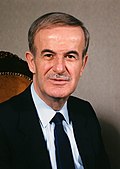| ||||||||||||||||||||
| ||||||||||||||||||||
 Results by governorate Assad: 90–100% Election not held | ||||||||||||||||||||
 Another variant of the presidential election 1999 results, which includes "against" and "invalid votes". | ||||||||||||||||||||
| ||||||||||||||||||||
Presidential elections were held in Syria on 10 February 1999. [1] There was only one candidate, incumbent president Hafez al-Assad, with voters asked to approve or reject his candidacy. A reported 100% of voters voted in favour, with a turnout of 98.5%. [2] Assad was re-elected for another seven-year term. However, he died in June 2000, resulting in an early presidential election that year.
